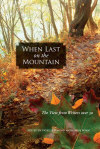When Last on the Mountain
“By the time you’re fifty if you’re in your right mind / you want a divorce from yourself.” Poet Ed Meek pretty well sums up my feelings about it. And similar insights, emotional accuracy, and appealing, understated voices like Meek’s pretty well sums up most of this anthology’s opening lines. Here is Susan Pepper Robbins (“Middle Solutions,” fiction): “‘I told him, I’m not dead yet. You can have them all then, but not now. Not before then.’ Mary turns her head to me, who is not dead yet either, although almost. This year I have lost twenty pounds and gained back thirty, so I’m ten ahead.” And here is Ann Olson (“Coteau, 1969,” nonfiction): “I’m cold. It’s dark. I don’t know where the hell we’re going.” And here is Christina Lovin (“Credo at Fifty-Five”):
“By the time you’re fifty if you’re in your right mind / you want a divorce from yourself.” Poet Ed Meek pretty well sums up my feelings about it. And similar insights, emotional accuracy, and appealing, understated voices like Meek’s pretty well sums up most of this anthology’s opening lines. Here is Susan Pepper Robbins (“Middle Solutions,” fiction): “‘I told him, I’m not dead yet. You can have them all then, but not now. Not before then.’ Mary turns her head to me, who is not dead yet either, although almost. This year I have lost twenty pounds and gained back thirty, so I’m ten ahead.” And here is Ann Olson (“Coteau, 1969,” nonfiction): “I’m cold. It’s dark. I don’t know where the hell we’re going.” And here is Christina Lovin (“Credo at Fifty-Five”):
I believe you reap what you sow
but that sometimes you can steal
your neighbor’s watermelon
and get away with it.
I believe that swallowing watermelon
Seeds will make you a virgin pregnant
in some states.
Virgin pregnancy may be an unpredictable theme for an anthology of writers over fifty, but it likely represents a divorce from one’s typical sense of self. This anthology consists largely of more typical or expected themes for we of the over-fifty set: retirement; illness; aging family members (and selves); memories of youth; the perils of love and romance in “old age” (are we old?); past failures; past successes; children lost and found; the nursing home; wars past and present (aren’t they all one war?); and death, death, death (others, our own). And why not? What writer of any age is not preoccupied with death? Isn’t art of any kind a hedge against oblivion?
The seven dozen or so poems, stories, and essays in When Last on the Mountain—all quite appealing and readable—were selected from more than 2,100 submissions, reports editor Carol Roan in her introduction. Some of the work has been previously published; some is new. While most of the writers are fairly accomplished, with numerous publications and accolades to their credit, there are no major stars here, no household names. There isn’t much innovation or inventiveness in form or style, this work is, by and large, safe and conventional. (Is it ever safe to draw attention, in a youth-obsessed culture, to age?) Nonetheless, there is a considerable range of subjects, geographies, and perspectives.
I was impressed beyond expression by the anthology’s opening line from Judith Serin’s essay “Sharing a Room with Your Sister”: “You don’t remember anything about this; it’s all stories.” Another of those utterly perfect beginnings, the anthology’s clear strength and most appealing component. Isn’t this precisely how, on some level, we will all end up summing up our lives: it’s all stories.





